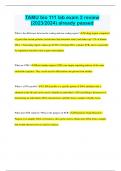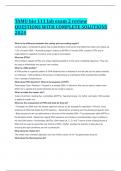Popular courses 'TAMU BIO 111' at TAMU BIO 111
TAMU BIO 111 Study guides, Class notes & Summaries
Looking for the best study guides, study notes and summaries about TAMU BIO 111? On this page you'll find 41 study documents about TAMU BIO 111.
All 41 results
Sort by
 Popular
Popular
-
TAMU bio 111 lab exam 2 review (2023/2024) already passed
- Exam (elaborations) • 14 pages • 2023
- Available in package deal
-
- $9.99
- 2x sold
- + learn more
TAMU bio 111 lab exam 2 review (2023/2024) already passed What is the difference between the coding and non-coding region? Coding region: comprised of genes that encode proteins (instructions that determine traits) and makes up 1-2% of human DNA. • Noncoding region: makes up 98-99% of human DNA, contains STRs and is responsible for regulatory functions such as gene transcription. What are STRs? Short-tandem repeats (STRs) are unique repeating patterns of the same nucleotide sequence. They can...
QUESTIONS AND ANSWERS
QUESTIONS AND ANSWERS

-
TAMU bio 111 lab exam 2 review 2024/2025 Questions And Answers 100% Solved | 100% Pass
- Exam (elaborations) • 8 pages • 2024
-
- $8.49
- + learn more
TAMU bio 111 lab exam 2 review 2024/2025 Questions And Answers 100% Solved | 100% Pass What is the difference between the coding and non-coding region? - Coding region: comprised of genes that encode proteins (instructions that determine traits) and makes up 1-2% of human DNA. • Noncoding region: makes up 98-99% of human DNA, contains STRs and is responsible for regulatory functions such as gene transcription. What are STRs? - Short-tandem repeats (STRs) are unique repeating pattern...

-
Tamu Bio 111 Exam 1 Study Guide (CH 1-5) Questions And Answers 100% Solved | Rated A+
- Exam (elaborations) • 11 pages • 2024
-
- $11.49
- + learn more
Tamu Bio 111 Exam 1 Study Guide (CH 1-5) Questions And Answers 100% Solved | Rated A+ EUKARYOTIC CELL - Cell containing a nucleus and membrane-enclosed organelles PROKARYOTIC CELL - Cell that lacks a nucleus or other membrane-enclosed organelles LEVELS OF BIOLOGICAL ORGANIZATION - Atoms, Molecules, Cells, Organelles, Tissues BIOLOGICAL DOMAINS - Bacteria, Archaea, Eukarya REDUCTIONIST APPROACH - Biologically break everything down into the simplest possible components SYSTEMS BIOLOGY AP...

-
TAMU BIO 111 Exam 1 2024/2025 Questions And Answers 100% Solved | 100% Pass
- Exam (elaborations) • 10 pages • 2024
-
- $10.99
- + learn more
TAMU BIO 111 Exam 1 2024/2025 Questions And Answers 100% Solved | 100% Pass Natural Science - · the field of science related to the physical world and its phenomena and processes. Physical Science - astronomy, chemistry, physics Life Science - Biology Basic Science - Science done to gain knowledge, regardless of the application. "knowledge for knowledge" Applied Science - Science applied to the real world. The problem is defined by the researcher Inductive Reasoning - Describes th...

-
TAMU BIO 111 Exam 1 2024/2025 Questions And Answers 100% Solved | 100% Pass
- Exam (elaborations) • 10 pages • 2024
-
- $8.99
- + learn more
Natural Science - · the field of science related to the physical world and its phenomena and processes. Physical Science - astronomy, chemistry, physics Life Science - Biology Basic Science - Science done to gain knowledge, regardless of the application. "knowledge for knowledge" Applied Science - Science applied to the real world. The problem is defined by the researcher Inductive Reasoning - Describes through careful observation and analysis of data. Scientist derive generalizations...

-
Tamu Bio 111 Exam 1 Study Guide (CH 1-5) Questions And Answers 100% Solved | Rated A+
- Exam (elaborations) • 11 pages • 2024
-
- $8.99
- + learn more
EUKARYOTIC CELL - Cell containing a nucleus and membrane-enclosed organelles PROKARYOTIC CELL - Cell that lacks a nucleus or other membrane-enclosed organelles LEVELS OF BIOLOGICAL ORGANIZATION - Atoms, Molecules, Cells, Organelles, Tissues BIOLOGICAL DOMAINS - Bacteria, Archaea, Eukarya REDUCTIONIST APPROACH - Biologically break everything down into the simplest possible components SYSTEMS BIOLOGY APPROACH - Tie small parts back together into a whole. EVOLUTION NEEDS THREE THINGS TO WORK...

-
TAMU BIO 111 Exam 1 2024/2025 Questions And Answers 100% Solved | 100% Pass
- Exam (elaborations) • 10 pages • 2024
-
- $8.49
- + learn more
Natural Science - · the field of science related to the physical world and its phenomena and processes. Physical Science - astronomy, chemistry, physics Life Science - Biology Basic Science - Science done to gain knowledge, regardless of the application. "knowledge for knowledge" Applied Science - Science applied to the real world. The problem is defined by the researcher Inductive Reasoning - Describes through careful observation and analysis of data. Scientist derive generalizations...

-
TAMU bio 111 lab exam 2 review (2023/2024) already passed Geaded A+
- Exam (elaborations) • 18 pages • 2024
-
- $12.99
- + learn more
TAMU bio 111 lab exam 2 review (2023/2024) already passed What is the difference between the coding and non-coding region? Coding region: comprised of genes that encode proteins (instructions that determine traits) and makes up 1-2% of human DNA. • Noncoding region: makes up 98-99% of human DNA, contains STRs and is responsible for regulatory functions such as gene transcription. What are STRs? Short-tandem repeats (STRs) are unique repeating patterns of the same nucleotide sequence. They can ...
TEXAS A&M BIOLOGY 111 PRACTICAL EXAM PREP EXAM QUESTIONS AND ANSWERS 20-24






